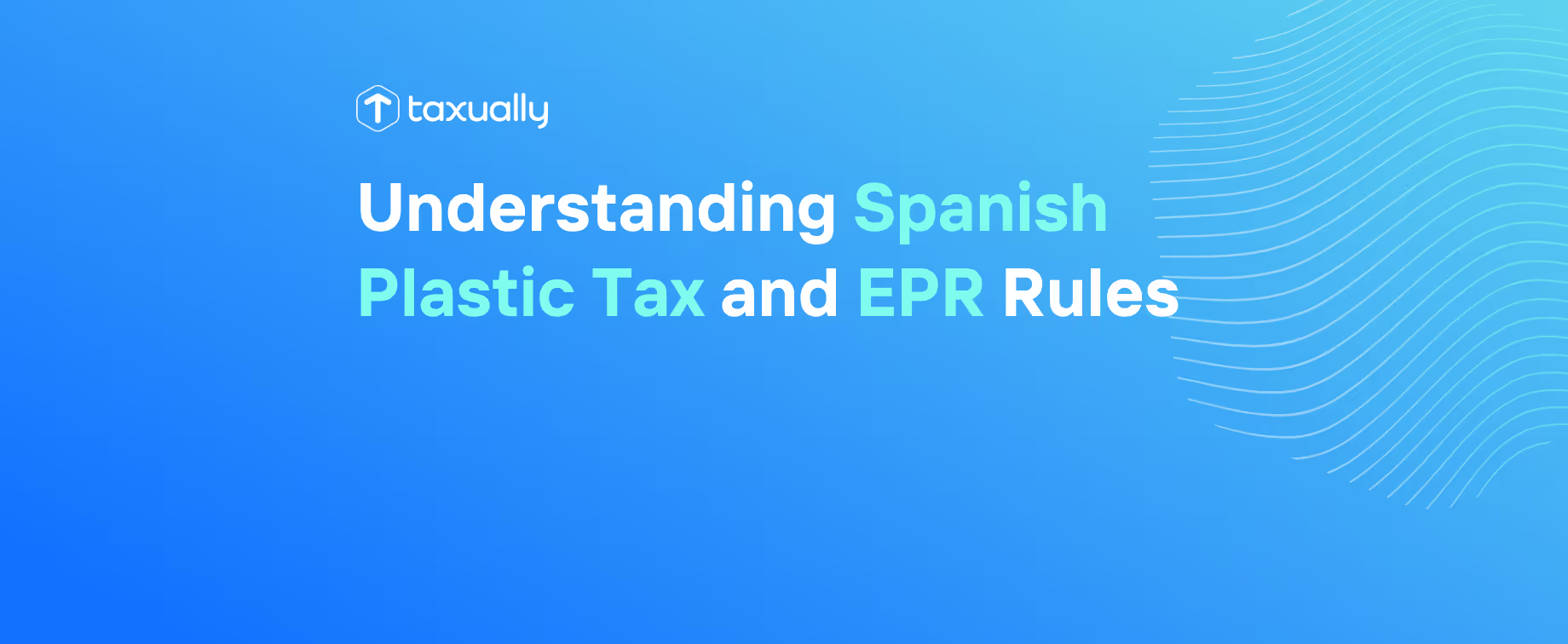Key takeaways
- The Spanish plastic tax applies €0.45/kg to non-recycled plastic packaging, with certain exemptions, and affects manufacturers, importers, and EU purchasers.
- Extended Producer Responsibility (EPR) makes producers accountable for the waste their products generate, covering packaging, electronics, and batteries.
- Compliance is mandatory—businesses must register, report, and pay applicable taxes or fees to avoid fines or legal consequences.
Extended Producer Responsibility (EPR) and the plastic tax are critical components of Spain's environmental strategy aimed at reducing waste and encouraging recycling. In this guide, we delve into what EPR and the plastic tax entail and what this means for businesses operating in Spain.
What is the Spanish plastic tax?
The Spanish plastic tax, which came into effect on January 1, 2023, is a legislative measure implemented by Spain to mitigate the environmental impact of plastic waste. This tax targets a broad spectrum of plastic packaging materials, including single-use items like straws and bags, with the primary goal of encouraging a shift towards more environmentally friendly alternatives.
By imposing this tax, the Spanish government aims to not only reduce plastic consumption but also support recycling and reuse initiatives, as well as the development of innovative waste management technologies.
Businesses involved in the sale or distribution of plastic packaging in Spain need to be aware of their potential obligations under this tax, which encompasses all forms of plastic packaging waste, irrespective of its application.
The tax is applicable across Spain, including in Ceuta, Melilla, and the Canary Islands.
Who is liable for the Spanish plastic tax?

Responsibility for the plastic tax in Spain falls primarily on manufacturers and importers of plastic products. For domestic manufacturers, the tax is due upon the first sale, or earlier if an advance payment is received. Importers must pay the tax upon entry into Spain, concurrently with any customs duties. For intra-EU acquisitions, the tax is due on the 15th of the month following the start of transport to the buyer or upon invoice issuance, whichever is earlier.
What is the scope of the Spanish plastic tax?
The plastic tax Spain rate is set at €0.45 per kilogram of non-recycled plastic waste, but there are exemptions for certain types of packaging, such as those that are biodegradable or compostable under specific standards. A monthly exemption applies to importers or intra-community purchasers for amounts below 5 kilograms.
The tax covers various plastic items including single-use bags, disposable tableware, packaging for food and beverages, and certain types of wrapping materials. However, exemptions are in place for packaging necessary for hygiene, medical purposes, or those intended for export outside of Spain, among others. There is also a refund mechanism for tax paid on exempt items.
Scope of Spanish plastic tax:
- Non-reusable plastic containers.
- Semi-finished plastic products intended for the production of non-reusable plastic packaging.
- Products made of plastic that are meant to be used to close, trade, or display non-reusable containers.
Examples of these products include:
- Plastic bags (including those used for carrying goods, food freezing, vacuum packaging, mailing, nappies, and snacks).
- Disposable plastic tableware (plates, glasses, cups, jugs) and beverage straws.
- Plastic blister packs, boxes, cases, etc.
- Plastic packaging for food and beverages, such as bottles, containers, and wrappers.
- Single-dose containers for food products, pharmacy or perfume products, or for samples used for advertising purposes (even if they can be refilled and reused).
- Plastic mesh or nets (such as those used for fruit, toys, or fishing).
- Plastic bags, trays, and materials used to preserve a product’s sterility.
- Lids and caps for non-reusable containers, regardless of the material the container is made of.
- Plastic rings designed to hold together units of a pack (such as drinks cans).
- Wrapping products, including packing tape, bubble wrap, and pallet covers.
How do I become plastic tax compliant?
Businesses must register and comply with the plastic tax by obtaining a digital certificate, registering online with the Spanish Tax Agency, calculating the tax due, and submitting payments on a regular basis. Non-compliant businesses risk penalties and fines. International businesses selling or distributing plastic products in Spain must appoint a local tax representative.
What is Extended Producer Responsibility (EPR) in Spain?
Extended Producer Responsibility (EPR) in Spain refers to a regulatory approach that assigns the accountability for the disposal and management of products at the end of their life cycle to the producers, importers, or distributors. This includes responsibilities for waste collection, recycling, and disposal.
In simpler terms, if you sell a product (or its packaging) in Spain that falls under EPR regulations, you are responsible for the waste it produces.
EPR has become a mandatory requirement in Spain, meaning that if your business operates within the country, you may need to adhere to specific EPR regulations.
Who does EPR affect in Spain?
EPR regulations in Spain impact any business that introduces products to the Spanish market, including those that:
- Manufacture products in Spain,
- Import products into Spain,
- Distribute products in Spain, even if the company is not based there.
Businesses involved in selling products that are subject to EPR (including sales through online marketplaces like Amazon) are required to finance the management of waste their products generate.
What product categories are covered by Spain EPR regulations?
In Spain, EPR regulations cover a variety of product categories, including:
- Packaging materials of all types (such as plastic, paper, glass, wood, metal) and any additional shipping materials (like fillers and padding).
- Electrical and Electronic Equipment (EEE), encompassing all items that need a battery or plug to operate.
- All types of batteries and accumulators, including those embedded within products.
How do I comply with Spain EPR regulations?

To comply with Spain EPR regulations, businesses must register for each relevant product category. Upon registration, you will receive an EPR registration number, which must be shared with Amazon or other marketplaces to demonstrate compliance.
Your business will also be required to fulfill reporting and financial obligations based on a set reporting frequency. This involves declaring sales and volumes and contributing financially to the designated authority for the covered reporting period.
Potential penalties for non-compliance
Compliance with EPR obligations and the plastic tax is not optional. Producers, importers, and other stakeholders must adhere to these regulations, including accurate reporting and payment of applicable fees and taxes. Failure to comply can result in significant penalties, including fines, suspension of business operations, or legal action.
Conclusion
Spain's adoption of EPR and the introduction of the plastic tax represent significant steps towards environmental sustainability and the promotion of a circular economy. While these regulations pose challenges for businesses, they also offer opportunities for innovation and leadership in sustainable practices. By understanding and embracing these responsibilities, companies can not only avoid potential penalties but also contribute to a more sustainable future for all.
Registering to become EPR and plastic tax compliant in Spain is a straightforward process with EcoTax. We’ll tell you what we need from you and when, and then we’ll take care of the rest. To find out more, book a free call with one of our green tax experts.
Frequently asked questions
New Year's Day - 1/1/2024Memorial Day - 5/27/20244th of July - 7/4/2024Labor Day - 9/2/2024Thanksgiving Day - 11/28/2024Day after Thanksgiving - 11/29/2024Christmas Eve - 12/24/2024Christmas Day - 12/25/2024
When did the Spanish plastic tax come into effect?
The Spanish plastic tax started on January 1, 2023, to reduce plastic waste and promote sustainability.
Who is responsible for paying the plastic tax in Spain?
Manufacturers, importers, and EU purchasers of non-reusable plastic packaging are liable for the tax.
What types of products are affected by the Spanish plastic tax?
The tax applies to single-use plastic items like bags, food containers, tableware, straws, and packaging materials.
Are there any exemptions to the Spanish plastic tax?
Yes, exemptions apply to biodegradable packaging, exports, medical uses, and imports under 5 kg monthly.
What is Extended Producer Responsibility (EPR), and why is it important?
EPR makes producers financially and legally responsible for the recycling and disposal of their products.
Which businesses are required to comply with EPR rules in Spain?
Any business that manufactures, imports, or sells regulated products in Spain must comply with EPR.
How can businesses comply with the Spanish plastic tax and EPR rules?
Businesses must register, report packaging/product data, and pay applicable fees through the Spanish Tax Agency.



















